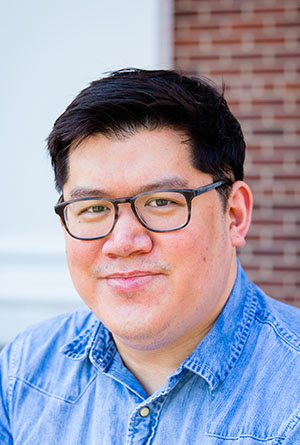UNO English major, Hau Nguyen interviews English faculty member Gene Kwak about his debut novel.
GENE KWAK was born and raised in the Midwest, spending most of his time in Nebraska and Iowa. He is the author of two chapbooks: Orphans Burning Orphans available from Greying Ghost Press and a self-titled collection available from Awst Press. His fiction and nonfiction have appeared in The Los Angeles Review of Books, The Rumpus, Wigleaf, Redivider, Hobart, Electric Literature, and the flash anthology Forward: 21st Century Flash Fiction. A graduate of the University of Nebraska Omaha (BS) and the University of Massachusetts Boston (MFA), he is an Instructor of English at UNO.
Go Home, Ricky! is Kwak’s debut novel from The Overlook Press. The book cover describes the book, “After seven years on the semipro wrestling circuit, Ricky, a.k.a. Richard Powell, needs one last match before he gets called up to the big leagues. Unlike some wrestlers who only play the stereotype, Ricky believes he comes by his persona honestly—he’s half white and half Native American—even if he’s never met his father. But the night of the match in Omaha, Nebraska, something askew in their intricate choreography sets him on a course for disaster. He finishes with a neck injury that leaves him in a restrictive brace and a video already going viral: him spewing profanities at his ex-partner, Johnny America. Injury aside, he’s out of the league. Without a routine or identity, Ricky spirals downward, finally setting off to learn about his father, and what he finds will explode everything he knows about who he is—as a man, a friend, a son, a partner, and a wrestler.”
Set in the world of semiprofessional wrestling, Go Home, Ricky! wrestles with the complexities of identity and deals with masculinity and tenderness, and fatherhood and motherhood. We asked the author a few questions about the novel and his writing journey.
Nguyen: Could you talk about the title of the novel and the process for coming up with the cover?
Kwak: The easy answer is that the term “go home” in wrestling parlance means to finish the match. And there were also obvious nods to finding Ricky’s home. I also wanted a title that sounded a little silly. Some smarter people than me tried to talk me into a more literary name, but I passed. As for the process of coming up with the cover, the designer at ABRAM, Eli Mock, sent me a couple of different takes. I made a few suggestions along with some feedback from my editor and agent. And then I asked for some minor changes, and we ended up in a place that I was pretty happy with. It’s even featured on an Instagram page that matches Taylor Swift outfits to book covers.
Nguyen: What inspired the idea for Go Home, Ricky!?
Kwak: It’s never really one thing. Omaha. Wrestling. Identity.
Nguyen: When did you start writing Go Home, Ricky!? How long did it take you to write this novel?
Kwak: I started really writing it in 2018. Before that I had a few pages, but nothing serious. Overall, it took me about three years to get most of the work done.
Nguyen: What was your hardest scene to write?
Kwak: It’s hard to say in hindsight. The easy answer is the most emotional ones, but that’s not always true. When I was in the thick of it, every day was both hard and also full of joy.
Nguyen: Are there any secrets from the novel that aren’t in the press release you could share with your readers?
Kwak: Yes. If you read the first word at the beginning of every chapter there’s a secret message. I’m messing around. No, no real secrets. It’s all out there.
Nguyen: What is the key message in the novel? Or what do you hope your readers take away from this book?
Kwak: I hope that readers enjoy the ride. But also understand that I was trying to upend some expectations. Whether or not I was successful is another story.
Nguyen: Could you name a fiction read that is your absolute favorite?
Kwak: Absolute favorites are hard to pin down. But some recent favorites include Afterparties by Anthony Veasna So, Pizza Girl by Jean Kyoung Frazier, and Sour Heart by Jenny Zhang.
Ngueyn: What advice would you give to a writer working on their first book?
Kwak: You have to put in the work. Put a little or a lot down if you can. And if you can’t, that’s okay too. You have to figure out what works for you. Also, try to find out what you really want to write and how you want to write it.
